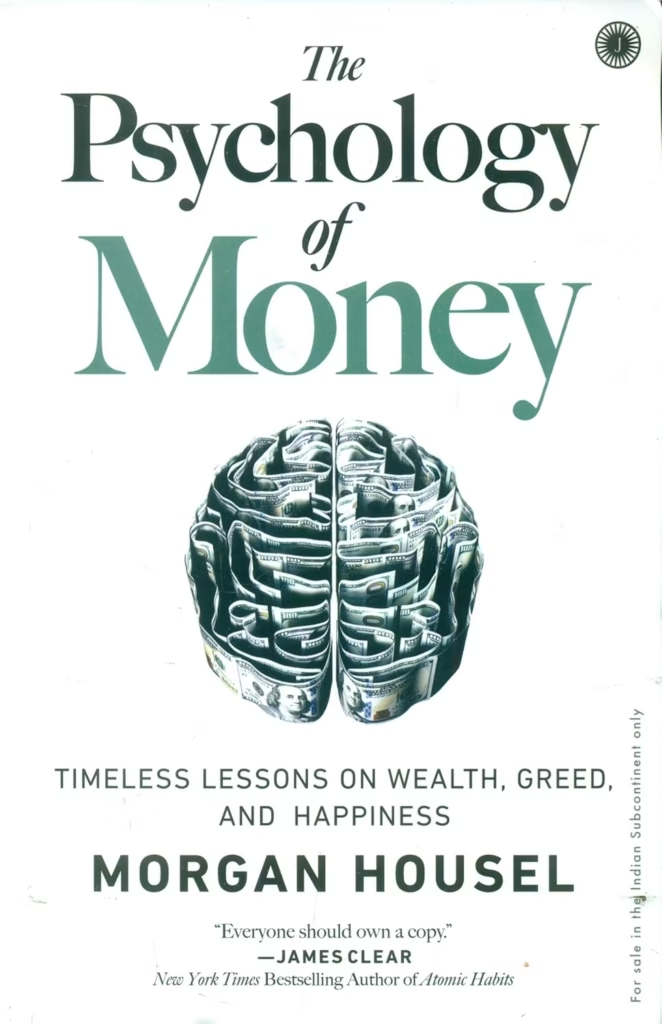Introduction – The Psychology of Money
The Psychology of Money: Timeless Lessons on Wealth, Greed, and Happiness by Morgan Housel is not your typical finance book. Rather than focusing solely on numbers or investment strategies, Housel explores how human behavior and psychology influence financial decisions. Through 19 insightful chapters and dozens of stories, the book breaks down why people do what they do with money—and how understanding this can lead to better financial outcomes.
This blog post delivers an in-depth, 2500+ word breakdown of the core insights, chapter summaries, and major takeaways from The Psychology of Money. Whether you’re a seasoned investor, a financial newbie, or someone curious about the intersection of money and mindset, Housel’s wisdom will resonate with you.
Table of Contents

Author’s Approach: Behavior Over Math
Morgan Housel believes that managing money well is not about intelligence or technical skill—it’s about behavior. Good investing is less about what you know and more about how you behave. Emotions like greed, fear, envy, and ego often drive financial decisions more than logic or data.
Quote: “Doing well with money has a little to do with how smart you are and a lot to do with how you behave.”
Chapter-by-Chapter Summary and Key Takeaways
1. No One’s Crazy
People’s financial decisions make sense to them based on their unique experiences. We all come from different backgrounds and time periods, which shape how we perceive risk, wealth, and opportunity.
Insight: There is no universally rational way to handle money—perspective is everything.
2. Luck & Risk
Housel emphasizes the roles of luck and risk in success and failure. Just because someone did well (or poorly) doesn’t mean they did everything right (or wrong).
Lesson: Focus on broad patterns of success, not individual outcomes.
3. Never Enough
Comparing yourself to others can be financially toxic. Many people sabotage their wealth by constantly moving the goalpost.
Takeaway: Know when you have enough and define your “enough.”
4. Confounding Compounding
Compounding is incredibly powerful—but it takes patience and time. Housel illustrates this with Warren Buffett’s wealth, noting that most of Buffett’s fortune was made after his 50s.
Quote: “Good investing is not necessarily about making good decisions. It’s about consistently not screwing up.”
5. Getting Wealthy vs. Staying Wealthy
It takes bold moves to build wealth, but conservatism and risk management to preserve it.
Key Idea: Getting rich and staying rich require two very different skill sets.
6. Tails, You Win
A small number of events often drive outcomes in business and investing. Outliers—”tail events”—are disproportionately powerful.
Insight: You only need to get a few things right to do really well.
7. Freedom
Housel argues that the ultimate form of wealth is the ability to control your time. Money is valuable to the extent it allows autonomy.
Takeaway: Time freedom is a powerful financial goal.
8. Man in the Car Paradox
People buy flashy things to signal success—but those watching rarely feel admiration. Instead, they admire the object, not the owner.
Message: True wealth is often invisible.
9. Wealth is What You Don’t See
Spending money to show people how much you have leaves you with less. Real wealth is saved, not spent.
Quote: “Spending money to show people how much money you have is the fastest way to have less money.”
10. Save Money
You don’t need a specific reason to save. Just save because the future is unpredictable.
Lesson: Saving gives you flexibility, options, and peace of mind.
11. Reasonable > Rational
You don’t need to make perfectly rational decisions—just ones that are reasonable and you can stick with over time.
Advice: A financial plan you can maintain is better than one you abandon.
12. Surprise!
The world is constantly changing. Historical data is useful, but the future will bring surprises.
Takeaway: Be humble and prepare for the unexpected.
13. Room for Error
Always leave margin for error in your financial planning. This creates resilience.
Key Insight: Budget for the unknown; avoid overconfidence.
14. You’ll Change
Your future self will likely want different things than you do now. Flexibility in your plan matters more than precision.
Lesson: Be adaptable—your goals and values will evolve.
15. Nothing’s Free
Everything has a price, even if it’s not monetary. Volatility, stress, and uncertainty are the prices of long-term gains.
Quote: “Everything has a price, but not all prices appear on labels.”
16. You & Me
Different people have different financial goals and timeframes. Don’t blindly follow others’ financial decisions.
Message: Customize your financial strategy to suit your own life.
17. The Seduction of Pessimism
Bad news grabs attention more than good news. But historically, optimism has been a better long-term strategy.
Advice: Be cautiously optimistic; the world improves more than we notice.
18. When You’ll Believe Anything
Narratives can be more persuasive than facts. Be careful with stories that are too neat or emotionally compelling.
Lesson: Stick with facts and data, but always question how they’re presented.
19. All Together Now
The final chapter wraps up the key principles: behavior, long-term thinking, humility, flexibility, and knowing what “enough” means.
Closing Thought: Mastering money is less about mastering finance and more about mastering yourself.
Broader Lessons & Practical Wisdom
1. Money Is Emotional
Financial decisions are often emotional, not logical. Recognizing this can help us make better choices.
2. Long-Term Thinking Wins
Those who succeed financially usually do so by thinking in decades, not days.
3. Simplicity Over Complexity
You don’t need complicated investment strategies. Simple, consistent behavior trumps genius.
4. Be Humble
Financial markets and life are unpredictable. Plan accordingly and remain open-minded.
5. Know Yourself
Financial success looks different for everyone. Your values, goals, and definition of success should shape your financial life.
Who Should Read This Book?
- Anyone looking to improve their relationship with money
- Investors seeking a mindset upgrade
- Those overwhelmed by traditional financial advice
- People interested in behavioral economics and decision-making
Conclusion: Master the Psychology, Master Your Money
The Psychology of Money is not a how-to manual but a guide for understanding yourself and your motivations. Housel’s stories, metaphors, and sharp insights make it clear that smart money management starts in the mind.
By focusing on behavior, self-awareness, and humility, this book provides timeless lessons that are just as useful for a beginner as they are for a seasoned investor.
Read, reflect, and apply—and remember, Take is Yours.
Need full copy??

- Unleashing the Future: Top 10 Healthcare AI Tools Revolutionizing Patient Care in 2025
- Ultimate Guide to Sustainable Travel Tips and Eco Friendly Travel 2025: Embrace Conscious Travel Trends & Green Travel Destinations
- Ultimate AI Revolution Uncovered: How Artificial Intelligence is Impacting Daily Life Globally in 2025
- Ultimate Digital Nomad Destinations 2025: Discover Where the World’s Best Remote Workers Are Heading Next
- The Future of Remote Work 2025 Trends Shaping How We Work


Leave a Reply
You must be logged in to post a comment.